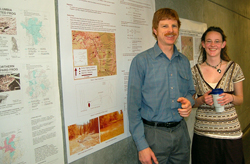
Field work for the three-year project, which starts in January, will be situated in the upper Snake River basin in Idaho and Wyoming at the Henry’s Fork (North Fork) watershed, considered by fly fishermen to be one of the premier trout fishing streams worldwide. Funding is provided by the U.S. Department of Agriculture through the Humboldt State Sponsored Programs Foundation.
The Humboldt State team will be led by alum Rob Van Kirk, (‘84), Associate Professor of Mathematics and a specialist in applying math and statistics to natural resource problems, including hydrologic modeling and data analysis. His past research of water flows centered on the lower Klamath basin, along the Scott River tributary in Siskiyou County.
“I anticipate that this Snake River work will provide thesis projects and experience for many HSU students far into the future,” Van Kirk said.
The faculty team comprises Brad Finney, Professor of Environmental Resources Engineering and an expert in surface and ground water hydrology and water resource management; Yvonne Everett, Associate Professor of Natural Resources Planning, who specializes in community-based management; Steve Steinberg, Associate Professor of GIS/Remote Sensing, who conducts spatial analysis and GIS applications in the social sciences; and J. Mark Baker, Assistant Professor of Politics, an expert in socioeconomics and community-based natural resource management.
HSU graduate students Brian Apple, Lora Liegel and Kimberly Peterson will work on hydrologic models and sociological methods to bolster water conservation and management.
The project team also includes three non-governmental organizations (NGOs) in the Henry’s Fork watershed: the Fremont-Madison Irrigation District, the Henry’s Fork Foundation and Friends of the Teton River.
“The inclusion of the NGOs is crucial to the success of this project because the research and extension objectives are built around meeting the needs of the watershed stakeholders,” Van Kirk underscored.
Scientists and students will develop quantitative models of ground and surface water flows and identify physical, economic and regulatory mechanisms to foster conservation and efficient water management on developed land. Based on this research, they will provide planners, decision makers and stakeholders with findings about the watershed’s hydrologic system and alternative conservation strategies.
In 2011, the HSU and NGO team will help the Henry’s Fork Watershed Council to develop a water conservation and management strategy aimed at two main objectives: making more water available for agriculture while enhancing ecological health in the watershed’s key stream reaches.
Van Kirk’s family moved to Arcata in 1969 and his father Bob had a 21-year career as a professor in fisheries and natural resources at HSU. The son returned to the Redwood Coast in 2006 under a U.S. Fish and Wildlife Service grant to investigate the relative effects of climate and water use patterns on base flows in the lower Klamath basin.
“What I discovered in that work is that although the effects of climate change are more apparent in northern California than in the interior West, the same types of changes in irrigation practices are resulting in the same types of hydrologic responses in the Klamath basin,” said Van Kirk, who was a math lecturer at Humboldt State in 1990-1991 and again in 1998. He returned to the Arcata campus in the spring of 2008 to teach statistics and biometry in the Mathematics Department. He also supervises master’s students in the Environmental Systems graduate program.
Van Kirk’s long experience with collaborative research and management in the Henry’s Fork watershed “made it the ideal location for the Department of Agriculture project,” he said. “My Klamath research convinced me that it would be of great interest to water managers and watershed stakeholders throughout the West to investigate the relationships among water use, land use, sociological factors and hydrologic response.”
Van Kirk previously collaborated with the Idaho Water Resources Research Institute under a sabbatical funded by the National Science Foundation and was named the 2008 R.L. Wallace Native Fish Conservationist of the Year by the Idaho chapter of the American Fisheries Society.
Kick-off meetings to acquaint the public with the Snake River project are scheduled Tuesday, Jan. 13, 2009 at 8:30 a.m. at the Cotton Tree Conference Room in Rexburg, Idaho, and on Wednesday, Jan. 14, 2009 at 5:30 p.m., at the Driggs Community Center in Driggs, Idaho. Details for the Jan. 13 meeting are available at (208) 624-3381 and for Jan. 14 at (208) 354-3871.